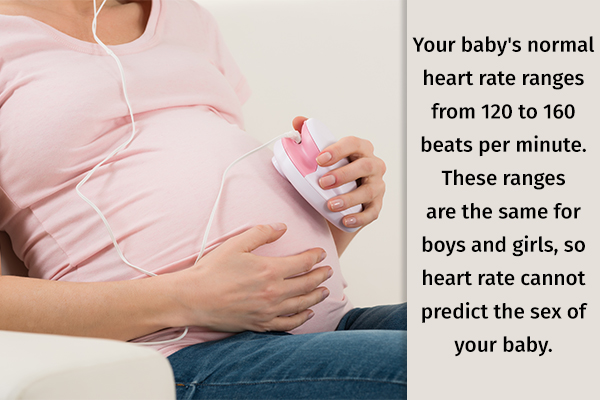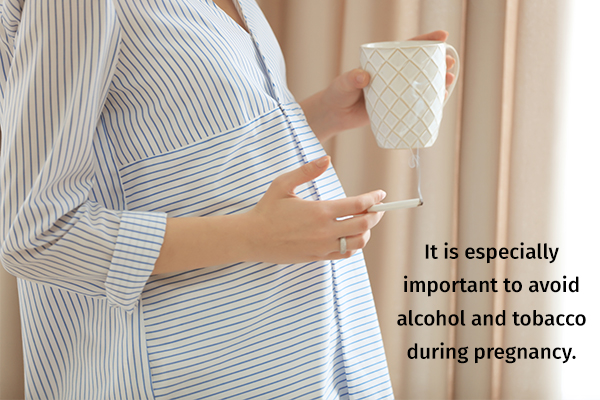In this article:
Will terrible heartburn guarantee your baby tons of hair and sideburns? Are coffee and your favorite foods off the menu? Is sex over for 9 months? Pregnancy is an exciting and anxiety-provoking time. Don’t let well-meaning friends and relatives stress you with their wild ideas.

Pregnancy can cause miseries such as nausea, vomiting, and back pain, but it should not require a complete lifestyle overhaul. Let’s debunk some myths so you can relax and enjoy your pregnancy.
1. The First Baby Always Arrives Early. False.
The first-born baby usually arrives near or after its due date. Once you have had a delivery, your second and third babies may arrive earlier than their due dates.
Babies tend to grow larger with each pregnancy. Be careful to track your weight gain, especially in the last trimester. Very large babies can be difficult to deliver vaginally.
2. You Can Tell the Baby’s Sex by Its Heart Rate. False.

Your baby’s normal heart rate ranges from 120 to 160 beats per minute. (1) The baby’s heart rate varies with activity and fluctuates throughout the day. These ranges are the same for boys and girls, so heart rate cannot predict the sex of your baby.
Anatomy and sex have usually been identified at the twenty-week anatomy scan. Now, new blood tests can confirm your baby’s sex as early as 9 weeks.
3. Sex Is Dangerous During Pregnancy. False
If you are comfortable, you should be able to continue intercourse. In some situations, however, intercourse may be dangerous.
You must avoid sex if you are diagnosed with placenta previa, (2) a condition in which the placenta implants over the cervix. (3) If you have this diagnosis, intercourse may cause contractions that open the cervix. The placenta can then detach from the cervix and bleed.
If you have vaginal bleeding, preterm contractions, or preterm labor and/or you are miscarrying, you should avoid sex. (2)
By the end of a normal pregnancy, intercourse should be fine. Sex has even been thought to help induce labor because semen contains prostaglandins. Prostaglandins are agents that are used to soften the cervix during induction.
Doctors even recommend sex to bring on labor. Interestingly, studies have not confirmed that this is effective. If you have any concerns about the safety of intercourse, be sure to ask your doctor for guidance.
4. You Should Not Exercise in Pregnancy. False.

The level of exercise that you can do in pregnancy depends on several factors. (4) In general, if you are healthy, you certainly should exercise. (5) If you have been exercising prior, you can continue.
Remember, you do not need a massive workout regimen: walking 30–60 minutes per day is enough. Weightlifting, swimming, biking, and the elliptical are all good choices too. Exercise will help with energy, sleep, and anxiety. It also increases endurance during labor.
Generally, your heart rate during exercise should remain under 140. If you lift weights, consider decreasing your squat weight after 20 weeks. Abdominal exercises done flat on your back and those that require bearing down should be reduced as well. Vigorous activity and heavy weightlifting may need to be modified as your pregnancy progresses.
Review your diagnosis with your doctor to see what exercises she recommends.
5. Heartburn Will Cause Your Baby to Have a Full Head of Hair. False
While it is so cute to see a newborn baby with a full head of hair and sideburns, heartburn will not guarantee this. No connection exists between increased gastric acid and baby hair growth.
Heartburn in pregnancy is common due to estrogen and progesterone. (6) These hormones affect intestinal movement and may cause slow stomach emptying.
To prevent burning stomach pain, you should avoid coffee, chocolate, and tomato sauce. Try not to eat or drink for 3 hours before bed. Your stomach will be empty, and less acid will flow back to your esophagus while you are lying down.
6. Spicy Food Will Affect the Baby. False.
If your stomach can handle spicy foods and you crave them, it is fine to indulge. Remember, the connection between you and your baby is the placenta.
The placenta passes nutrients and oxygen to your baby through a complex exchange. The nutrients transported through your blood will not affect your baby’s intestinal tract.
When you are breastfeeding though, foods that you eat may affect your baby’s digestion. It is a good idea to change your diet during breastfeeding if you see effects on your baby. (7)
7. You Can Have Fewer Children if You Have a C-section. False.
If your labor is complicated or risky for your baby, you may need to have a cesarean delivery. Sometimes patients fear that having a cesarean means they will never be able to deliver vaginally. They also worry that multiple cesareans mean they will not be able to have several children.
It is true that the risk of abdominal scarring increases with additional C-sections. Still, you should be able to have many children with success.
Both cesareans (8) and vaginal deliveries (9)(10) carry the risks of infection and hemorrhage. Discuss these risks with your doctor. Together you will decide which delivery route is best for you.
8. Sleeping on Your Back Will Hurt Your Baby. False

The large vessels that supply your body run near your spine. When you lie flat on your back, your growing uterus can compress them. These vessels are very large and difficult to constrict. The pressure is generally not enough to obstruct blood flow to the placenta.
If blood flow to your arms and legs decreases while you are sleeping, you will have numbness and tingling. This will prompt you to wake up or change position. If you wake up on your back, don’t panic. Just roll to your side and keep sleeping.
9. A Nuchal Cord Is Dangerous. False.
Nuchal cord refers to an umbilical cord wrapped around a baby’s neck. Babies can be born with cords around their necks without difficulty. (11)
You may be concerned and want to identify a nuchal cord on ultrasound. Even when noted on ultrasound, a nuchal cord alone is not a reason for delivery. If the cord is very tight, the delivery of blood and oxygen to the baby could decrease during labor. This might lead to fetal distress and possibly a C-section.
Fetal monitoring before and during labor can help to identify fetal distress. (12)
10. Pregnant Women Should Eat for Two. False.

You should not have to increase your food intake because you are pregnant. If you are at your ideal weight, a 25- to 30-pound weight gain is ideal. (13)
Underweight teenagers and patients with twins may need to adjust their diets to make sure their babies gain adequate weight. Very overweight patients may not need to gain much weight if their babies are growing appropriately.
Remember, you may lose 10–12 pounds at delivery, but you will have to lose any fat you have gained. Breastfeeding can help, but you do not want to pack on pounds that you will have a hard time losing.
Also, gaining too much weight, especially in the third trimester, increases the risk that your baby will be large at the time of delivery. (14) Throughout pregnancy, be careful about indulging in sweets and simple carbohydrates. This is especially important if you are at risk for gestational diabetes. These empty calories can lead to weight gain. Their intake should be minimized, if possible.
11. You Cannot Have Any Coffee in Pregnancy. False.
Several studies have looked at the risks of caffeine intake during pregnancy. The effects of excess caffeine are not yet clear. Moderate caffeine intake (less than 200 milligrams/day) does not seem to increase the risk of miscarriage or preterm birth.
One eight-ounce cup of coffee contains about 137 grams of caffeine. Tea, soda, and chocolate all contain caffeine, so consider your total daily intake while pregnant. (15)(16)
12. You Should Avoid Hot Tubs. True.
When you overheat, your body has mechanisms to cool itself. Your baby, however, has no way to cool itself off inside the uterus.
Animal studies have shown that high temperatures can cause harm, especially during the first twelve weeks of development. (17) Try not to become overheated during your pregnancy. While bathwater cools, the water in hot tubs remains set at a high temperature. To avoid overheating your baby, save hot tubs until after delivery. (18)
13. It Is Safe to Smoke and Drink Alcohol During Early Pregnancy. False.

In the first trimester, your baby’s organ systems are developing. The baby’s heart, intestines, and nervous system form during the first 12 weeks. These systems can be affected by radiation, toxins, medications, and some infections.
It is important to avoid teratogens (substances that cause fetal damage) during this time. It is especially important to avoid alcohol and tobacco during this period. (19) Alcohol passes through the placenta to your baby.
“Since alcohol is broken down more slowly in a fetus than in an adult, alcohol levels tend to remain high and stay in the baby’s body longer.” Fetal exposure to alcohol can lead to fetal alcohol syndrome, and no level of exposure is known to be safe. Avoid alcohol while you are pregnant.
Smoking is another habit that harms babies. Smoking can lead to low birth weight and preterm delivery. Babies that are born preterm may have difficulty immediately after birth and through childhood. (20) Both you and your baby will benefit if you give up smoking.
Final Word
If you are in good health, you should be able to enjoy your pregnancy. Continue to eat well and exercise. Pay attention to your body’s needs and discuss concerns with your provider.
Hopefully, your pregnancy symptoms are mild, and you can continue your normal lifestyle. Pregnancy is a fun and important part of life. Avoiding unnecessary worry will allow you to enjoy yourself. Then, you can enjoy preparing for your baby.
- Was this article helpful?
- YES, THANKS!NOT REALLY


